Game 283: Nippon (1988)
Game 283: Nippon (1988) - Hallo Guyst Review Games Update, In the article you read this time with the title Game 283: Nippon (1988), we have prepared this article well for you to read and take information in it. hopefully the post content
Artikel Nippon, what we write can you understand. alright, happy reading.
Title : Game 283: Nippon (1988)
link : Game 283: Nippon (1988)
Nippon
Nippon is a strange little German game set in feudal Japan. Screenshots will make it look like an Ultima clone, but it plays much more like an era console game like Hydlide, particularly with the limited controls and lack of any character creation.
The backstory is mostly indecipherable. Commenters have pointed me to the Nippon Museum, created a few years ago by Nippon co-creator Thorsten Sommermann. The site offers four different versions of the story, each more elaborate (and confusing) than the last. I'm not sure which one was presented to original players of the game. In any event, it presents the main character as a modern wage slave (named Toshiro Tawamure in one version) who becomes obsessed with a pair of two life-size bronze statues at the Tokyo National Museum and/or their tragic story. Seifuku Subarashii Tenno (which I think is supposed to mean "Emperor Seifuku the Great") was told by an oracle to seek his true love. After multiple trials and battles, he found Princess Kikori Shiramoto and married her, realizing after their marriage that she was the wrong woman. The haunted faces of the statues reflect lives of sadness and betrayal.
As Toshiro is studying the statues one day, an old woman--who looks suspiciously like the statue of Kikori--grabs his arm and tells him that he must "go back" and "try again," emphasizing that he was "so close" last time. Toshiro suddenly finds himself hurled back in time to the feudal era, appearing on a deserted plain in a loincloth.
Gameplay actually begins in a side-view of modern Tokyo, but the character can't do anything except wander past the buildings until he reaches the museum and steps between the two (decidedly not bronze) statues. This warps him to ancient Nippon, where the game really begins.
There is thus no character creation. The character's name appears nowhere in-game, but he has meters for strength, flexibility, constitution, and hit points, as well as a value from 25-100 representing his skill with his currently-held weapon. He has 300 gold pieces and a few items of food. The town of Akuji lies nearby.
Any intrigue that I felt about the game's premise disappeared in a rage when I was introduced to its interface, which consists solely of a joystick. The developers eschewed the perfectly serviceable Commodore 64 keyboard to require players to press a button to enter "menu mode" and cycle through the various icons to choose options: combat, movement, speak, swap equipment, character status, meditate, disk options, eat, collect gold, use, search, sleep, and open. Many of these options lead to further choices in a vertical menu, and if those choices involve a number, you have to scroll through the various number positions to set each of them from 0 to 9.
I know from experience that some thundering fools will come out of the woodwork to defend this practice, talking about how cool and novel the joystick was in 1988, but it makes for a miserable gameplay experience. If there were honestly players with joystick cords long enough, and monitors big enough, that they could sit back from their computers in their easy chairs to play PC games away from the keyboard, the developers still should have offered the keyboard as an alternative.
There are a couple of features that make the problem even worse. First, the joystick scrolls the icons the wrong way. I mean, it's technically correct if you imagine that it's the icon "strip" that's moving, not the central window, but it still would have been more intuitive to do it the other way. Second, action doesn't stop in the game world when you enter icon mode. So the game will say you're hungry, and you press the button, scroll to the "eat" icon, scroll through your food options, select one, set the counter for how many, and execute--and in the meantime a vampire can come along and start pounding at you. Even worse is when you're trying to talk with an NPC and he wanders away before you can get to the "speak" icon. Gameplay doesn't even stop when you're trying to save or transition areas and the game asks you for another disk. If you were playing this back in 1988, you wouldn't want to sit back from the computer because you'd have to be ready to pounce the moment that the "insert Disk 1" screen came up.
Nippon takes place in a large world with several large landmasses and hundreds of islands. The world is dotted with cities and castles offering the usual types of RPG services like weapon and armor shops, training, healing, food, and taverns. Food is a constant issue. You can only carry 20 meals at a time, and each meal satisfies you for about 3 minutes before the game tells you that you're hungry again. You can eat more than one meal at once, but the returns diminish so that eating 3 only shuts the game up for about 7 minutes instead of 9. A full game day requires at least half of your meals, so you can't be away from a city for too long.
The 300 gold with which I started the game was enough for me to purchase a tanto and a set of "armor" called bauernkluft, which I think means "peasant's outfit." After that, I went outside to try to earn some more gold for food and training.
You can enter combat mode whenever there is at least one enemy on the screen. Once in combat mode, you're locked onto the current screen and can't wander off the edges. You fight by facing the enemy and hitting the joystick button. If you have a missile weapon like a shuriken, you can attack from a distance (and it apparently magically returns to you, because once you equip one, you don't run out). Later on, there are apparently scrolls you can purchase to cast spells in combat.
As I mentioned, you have a separate "weapon skill" for every weapon, starting at 25% and going to 100%. You can pay 100 gold pieces to train in 25% increments at any city with a weapons trainer. Weapons and armor can break in combat and must be repaired at special shops.
Once all the enemies are dead, you exit combat and see your rewards in terms of gold and experience. Gold rewards are pretty decent. I'm not sure what experience does for you. In the first few hours, I didn't "level up" at all, and I didn't notice any changes to my attributes. There isn't even anywhere that you can check your experience total.
Post-combat, hit points generate from walking around and sleeping. You can sleep manually, but otherwise, when the game decides you're tired, you hit the ground wherever you are no matter how inconvenient.
Cities are swarming with NPCs, many of whom, in the tradition of the early Ultimas, deliver only single lines. Guards say, "Show me your papers." Clerics: "Repent your sins, my sons." Ninjas: "Shall I kill someone for you?" Occasionally, you come across someone with more to say, and the game asks you what kind of attitude you want to adopt, including submissive, religious, normal, friendly, bribing, superior and threatening. So far, I've been defaulting to "friendly" and haven't noticed any major differences. Occasionally, an NPC will say something that gives you a choice of keywords for reply. For instance, a warrior who says, "I am on a quest for gold" might offer follow-up lines based on "quest" and "gold." So far, none of these options have delivered any significant hints or bits of lore, but to be fair having to translate all of the dialogue leaves me uneager to scour every town for every NPC.
But try I must, because I otherwise have no idea where to go or what to do in the game. Clearly, I need to get a boat at some point, and there's an interesting-looking castle in the middle of a lake that might house a king with a quest. There are features in the middle of uncrossable mountains, so somewhere there must be an object or spell that lets you cross them. Scanning through the notes on the museum site, it appears I have yet to experience the ability to purchase slaves and guard dogs, or to find a tavern with options between "a room" and "a room and a woman," or find one of several places where you can answer a riddle and get your attributes increased. I did find a "sensei" who offered to increase my endurance, but I didn't have enough money at the time. So far, I haven't found anything that looks like a "dungeon."
The title of the game got me thinking about endonyms and exonyms and why we tolerate the latter anymore. I mean, I have no problem with Los Estados Unidos or Les États Unis because they're literal translations, but I think I'd be pretty annoyed if I went to Italia and it turned out their official name for us was Terra Degli Asini. That's what exonyms often are, of course: the ancient equivalent of "those bozos on the other side of the river." Who am I to condescendingly tell someone from Maṣr that he's really "Egyptian," or to presume that a Magyarországian's ancestors were "Huns"? I mean, I get the traditional and historical reasons that exonyms developed in the first place, but by the twenty-first century, in a global community, shouldn't we be talking more about abandoning them? Germans, if you want to use "Deutschland" (despite the fact that it sounds like a guy with a Brooklyn accent saying "Durchland") instead of "Germany," I should honor that. And if "Japan" ever gets it together on how to correctly pronounce its own name, I'll use that, too.
Time so far: 3 hours
You are now reading the articlel Game 283: Nippon (1988) with link address https://reviewgameupdate.blogspot.com/2018/03/game-283-nippon-1988.html
Title : Game 283: Nippon (1988)
link : Game 283: Nippon (1988)
Game 283: Nippon (1988)
Nippon
Germany
Independently developed; published by Markt & Technik
Released in 1988 for Commodore 64
Date Started: 26 February 2018
Nippon is a strange little German game set in feudal Japan. Screenshots will make it look like an Ultima clone, but it plays much more like an era console game like Hydlide, particularly with the limited controls and lack of any character creation.
The backstory is mostly indecipherable. Commenters have pointed me to the Nippon Museum, created a few years ago by Nippon co-creator Thorsten Sommermann. The site offers four different versions of the story, each more elaborate (and confusing) than the last. I'm not sure which one was presented to original players of the game. In any event, it presents the main character as a modern wage slave (named Toshiro Tawamure in one version) who becomes obsessed with a pair of two life-size bronze statues at the Tokyo National Museum and/or their tragic story. Seifuku Subarashii Tenno (which I think is supposed to mean "Emperor Seifuku the Great") was told by an oracle to seek his true love. After multiple trials and battles, he found Princess Kikori Shiramoto and married her, realizing after their marriage that she was the wrong woman. The haunted faces of the statues reflect lives of sadness and betrayal.
As Toshiro is studying the statues one day, an old woman--who looks suspiciously like the statue of Kikori--grabs his arm and tells him that he must "go back" and "try again," emphasizing that he was "so close" last time. Toshiro suddenly finds himself hurled back in time to the feudal era, appearing on a deserted plain in a loincloth.
 |
| The time travel didn't strip his armor; he was only wearing a loincloth in the first place. |
Gameplay actually begins in a side-view of modern Tokyo, but the character can't do anything except wander past the buildings until he reaches the museum and steps between the two (decidedly not bronze) statues. This warps him to ancient Nippon, where the game really begins.
There is thus no character creation. The character's name appears nowhere in-game, but he has meters for strength, flexibility, constitution, and hit points, as well as a value from 25-100 representing his skill with his currently-held weapon. He has 300 gold pieces and a few items of food. The town of Akuji lies nearby.
 |
| The opening area. |
Any intrigue that I felt about the game's premise disappeared in a rage when I was introduced to its interface, which consists solely of a joystick. The developers eschewed the perfectly serviceable Commodore 64 keyboard to require players to press a button to enter "menu mode" and cycle through the various icons to choose options: combat, movement, speak, swap equipment, character status, meditate, disk options, eat, collect gold, use, search, sleep, and open. Many of these options lead to further choices in a vertical menu, and if those choices involve a number, you have to scroll through the various number positions to set each of them from 0 to 9.
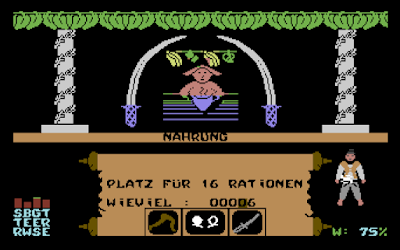 |
| Setting the number of fish I'm buying by turning individual numbers in a counter. |
I know from experience that some thundering fools will come out of the woodwork to defend this practice, talking about how cool and novel the joystick was in 1988, but it makes for a miserable gameplay experience. If there were honestly players with joystick cords long enough, and monitors big enough, that they could sit back from their computers in their easy chairs to play PC games away from the keyboard, the developers still should have offered the keyboard as an alternative.
There are a couple of features that make the problem even worse. First, the joystick scrolls the icons the wrong way. I mean, it's technically correct if you imagine that it's the icon "strip" that's moving, not the central window, but it still would have been more intuitive to do it the other way. Second, action doesn't stop in the game world when you enter icon mode. So the game will say you're hungry, and you press the button, scroll to the "eat" icon, scroll through your food options, select one, set the counter for how many, and execute--and in the meantime a vampire can come along and start pounding at you. Even worse is when you're trying to talk with an NPC and he wanders away before you can get to the "speak" icon. Gameplay doesn't even stop when you're trying to save or transition areas and the game asks you for another disk. If you were playing this back in 1988, you wouldn't want to sit back from the computer because you'd have to be ready to pounce the moment that the "insert Disk 1" screen came up.
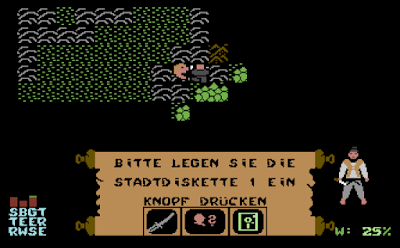 |
| Attacked while switching disks. |
Nippon takes place in a large world with several large landmasses and hundreds of islands. The world is dotted with cities and castles offering the usual types of RPG services like weapon and armor shops, training, healing, food, and taverns. Food is a constant issue. You can only carry 20 meals at a time, and each meal satisfies you for about 3 minutes before the game tells you that you're hungry again. You can eat more than one meal at once, but the returns diminish so that eating 3 only shuts the game up for about 7 minutes instead of 9. A full game day requires at least half of your meals, so you can't be away from a city for too long.
The 300 gold with which I started the game was enough for me to purchase a tanto and a set of "armor" called bauernkluft, which I think means "peasant's outfit." After that, I went outside to try to earn some more gold for food and training.
 |
| The "armor" shop sells a "peasant's outfit" and a "monk's robe." |
You can enter combat mode whenever there is at least one enemy on the screen. Once in combat mode, you're locked onto the current screen and can't wander off the edges. You fight by facing the enemy and hitting the joystick button. If you have a missile weapon like a shuriken, you can attack from a distance (and it apparently magically returns to you, because once you equip one, you don't run out). Later on, there are apparently scrolls you can purchase to cast spells in combat.
 |
| Fighting a giant at night. |
As I mentioned, you have a separate "weapon skill" for every weapon, starting at 25% and going to 100%. You can pay 100 gold pieces to train in 25% increments at any city with a weapons trainer. Weapons and armor can break in combat and must be repaired at special shops.
 |
| With my shuriken, I can attack an enemy across the water (literally " a head") that can't retaliate. |
Once all the enemies are dead, you exit combat and see your rewards in terms of gold and experience. Gold rewards are pretty decent. I'm not sure what experience does for you. In the first few hours, I didn't "level up" at all, and I didn't notice any changes to my attributes. There isn't even anywhere that you can check your experience total.
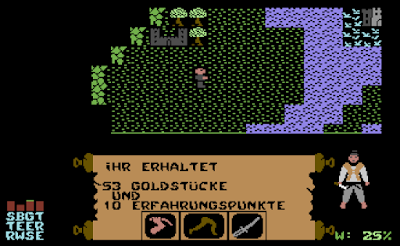 |
| The spoils of combat. |
Post-combat, hit points generate from walking around and sleeping. You can sleep manually, but otherwise, when the game decides you're tired, you hit the ground wherever you are no matter how inconvenient.
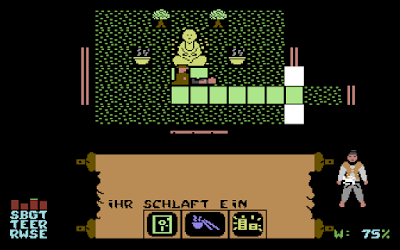 |
| Hopefully, Buddha isn't insulted by this. |
Cities are swarming with NPCs, many of whom, in the tradition of the early Ultimas, deliver only single lines. Guards say, "Show me your papers." Clerics: "Repent your sins, my sons." Ninjas: "Shall I kill someone for you?" Occasionally, you come across someone with more to say, and the game asks you what kind of attitude you want to adopt, including submissive, religious, normal, friendly, bribing, superior and threatening. So far, I've been defaulting to "friendly" and haven't noticed any major differences. Occasionally, an NPC will say something that gives you a choice of keywords for reply. For instance, a warrior who says, "I am on a quest for gold" might offer follow-up lines based on "quest" and "gold." So far, none of these options have delivered any significant hints or bits of lore, but to be fair having to translate all of the dialogue leaves me uneager to scour every town for every NPC.
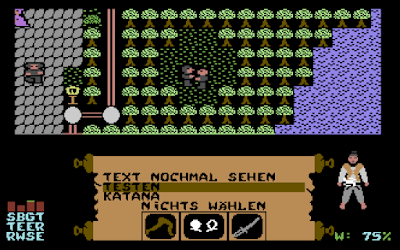 |
| A couple of keywords about testing his katana against trees. |
But try I must, because I otherwise have no idea where to go or what to do in the game. Clearly, I need to get a boat at some point, and there's an interesting-looking castle in the middle of a lake that might house a king with a quest. There are features in the middle of uncrossable mountains, so somewhere there must be an object or spell that lets you cross them. Scanning through the notes on the museum site, it appears I have yet to experience the ability to purchase slaves and guard dogs, or to find a tavern with options between "a room" and "a room and a woman," or find one of several places where you can answer a riddle and get your attributes increased. I did find a "sensei" who offered to increase my endurance, but I didn't have enough money at the time. So far, I haven't found anything that looks like a "dungeon."
 |
| "Pain does not exist in this dojo, does it?" |
The title of the game got me thinking about endonyms and exonyms and why we tolerate the latter anymore. I mean, I have no problem with Los Estados Unidos or Les États Unis because they're literal translations, but I think I'd be pretty annoyed if I went to Italia and it turned out their official name for us was Terra Degli Asini. That's what exonyms often are, of course: the ancient equivalent of "those bozos on the other side of the river." Who am I to condescendingly tell someone from Maṣr that he's really "Egyptian," or to presume that a Magyarországian's ancestors were "Huns"? I mean, I get the traditional and historical reasons that exonyms developed in the first place, but by the twenty-first century, in a global community, shouldn't we be talking more about abandoning them? Germans, if you want to use "Deutschland" (despite the fact that it sounds like a guy with a Brooklyn accent saying "Durchland") instead of "Germany," I should honor that. And if "Japan" ever gets it together on how to correctly pronounce its own name, I'll use that, too.
Time so far: 3 hours
At All Articles Game 283: Nippon (1988)
Thanks For Reading Game 283: Nippon (1988) this time, hopefully it can benefit you all. alright, see you in another article post.
You are now reading the articlel Game 283: Nippon (1988) with link address https://reviewgameupdate.blogspot.com/2018/03/game-283-nippon-1988.html

0 Response to "Game 283: Nippon (1988)"
Posting Komentar